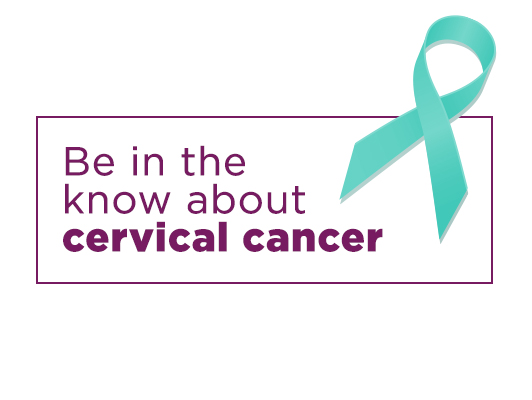Be in the know about cervical cancer

January is Cervical Cancer Awareness Month, a chance to raise awareness about how women can protect themselves from HPV (human papillomavirus) and cervical cancer. Awareness is key because this disease is detectable and preventable. Get educated about your risk, know your options for prevention, and recognize screening opportunities available. We have the facts for you below.
What is cervical cancer?
Cervical cancer is a cancer of the cervix. The cervix is the lower part of the uterus that opens into the vagina. Cervical cancer is diagnosed when abnormal cells are found that grow out of control. This is among the most common forms of cancer in women, but it can be found and diagnosed early through a Pap test. Most cervical cancer is caused by HPV, which is spread through sexual contact. According to the CDC, if cervical cancer is found early, it is highly treatable and associated with long survival and good quality of life. {1}
How many people get it?
According to 2015 statistics an estimated 12,900 new cases of invasive cervical cancer will be diagnosed each year, and about 4,100 of those women will die. Cervical cancer was once one of the most common causes of cancer death in American women, but testing and screening have decreased the death rate by about 50 percent.
What is HPV?
HPV is the most common sexually transmitted disease. It’s also a major cause of cervical cancer. About 79 million Americans currently have HPV. Many people with HPV don’t know they are infected; that’s why it’s important to be vaccinated. Not all forms of HPV cause cervical cancer and sometimes an infection will go away on its own. A Pap test can detect changes in cells before they turn into cancer. {2}
How can I prevent HPV?
There are several things you can do to lower your risk of getting HPV. First, talk to your doctor about getting vaccinated. The vaccines have been found to be both effective and safe. It’s also important to follow through with regular cervical cancer screenings. If you are sexually active, it’s important to use protection and stay in a mutually monogamous relationship. {2}
Can I prevent cervical cancer?
You can get tested to find pre-cancers before they turn into a more invasive form of cancer. It’s recommended to have a Pap test and the HPV test, which can be done during a pelvic exam. It’s also important to minimize risk of exposure to HPV, get the HPV vaccination if you are of age, and make healthy lifestyle choices like not smoking. {3}
Who should be screened and what are screening guidelines?
The Pap test is recommended for all women between 21 and 65 years old. If your test results are normal, your doctor may tell you that you can wait and get the test every three years. If you are older than 30 years old, you can choose to do HPV and Pap testing together. This is called co-testing. Always partner with your doctor for his or her screening recommendations to make sure you are getting recommended testing at appropriate intervals. {1}
Resources:
- Centers for Disease Control and Prevention: http://www.cdc.gov/cancer/cervical/
- Centers for Disease Control and Prevention: http://www.cdc.gov/STD/HPV/STDFact-HPV.htm
- American Cancer Society: http://www.cancer.org/cancer/cervicalcancer/index



